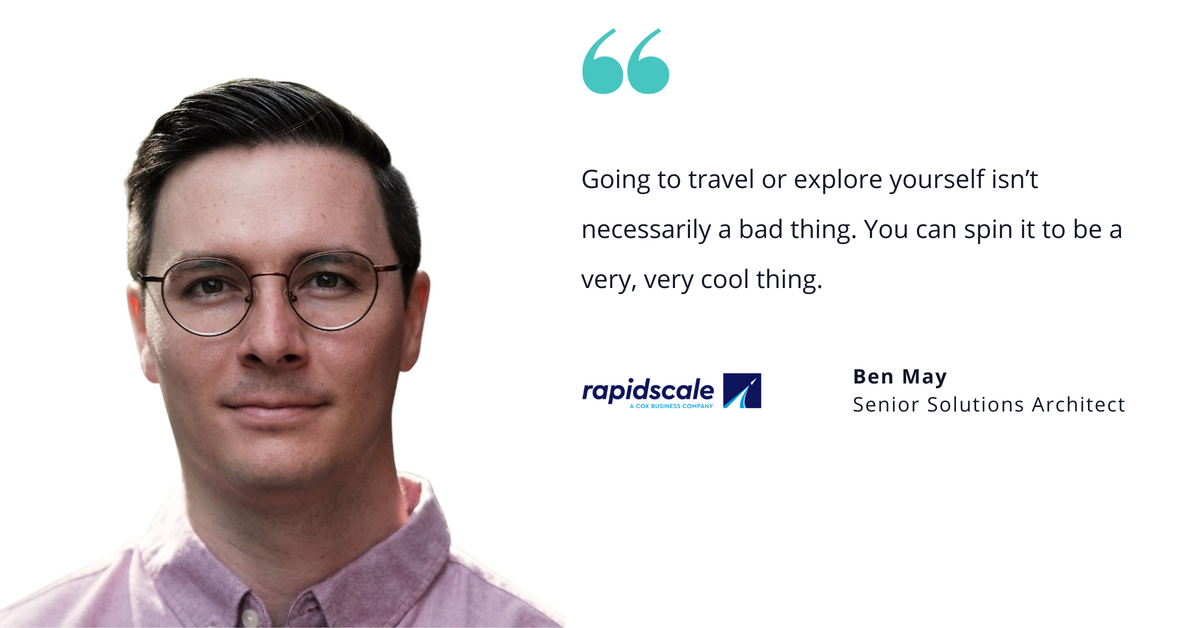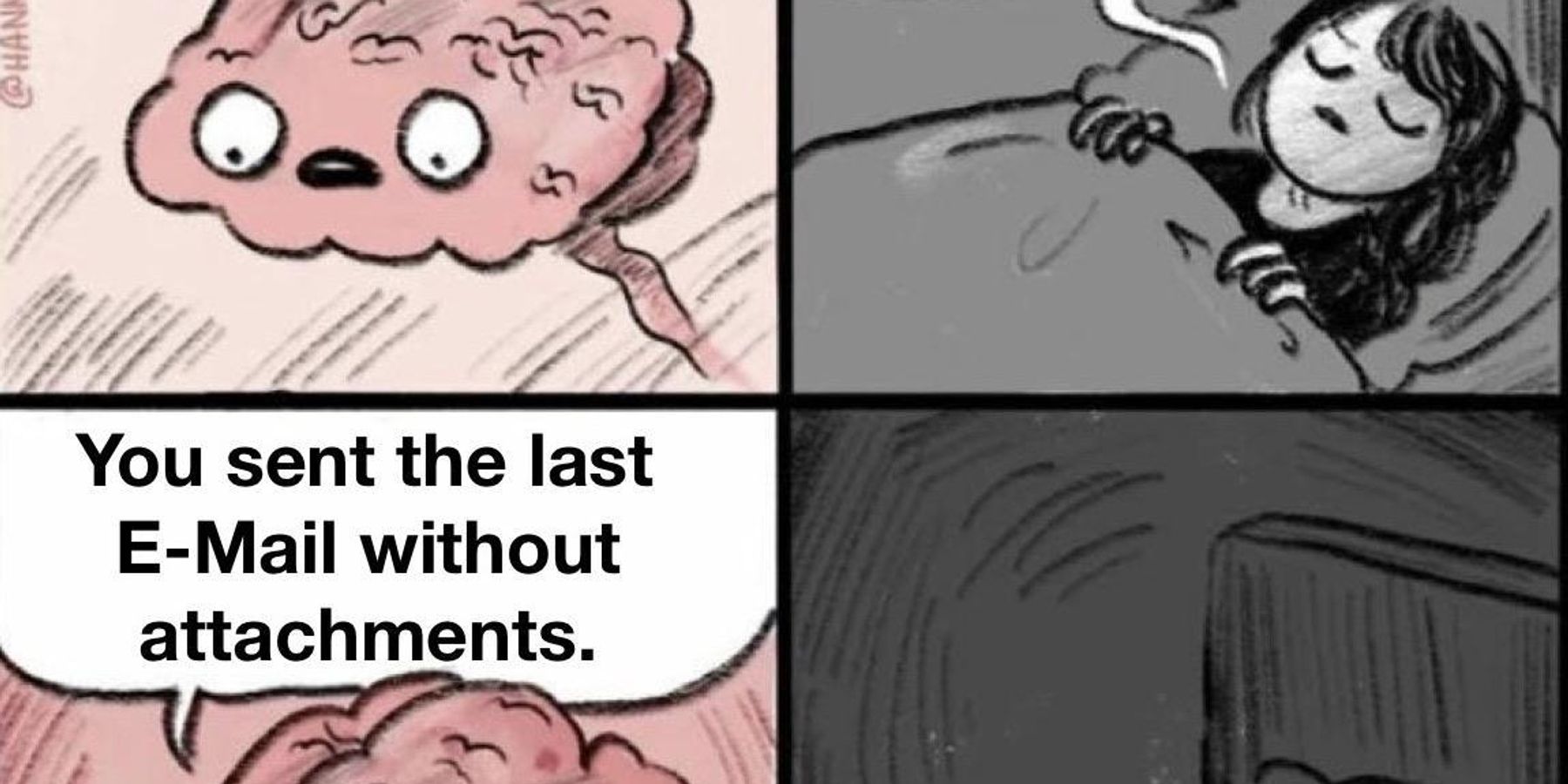Logicworks is now part of the RapidScale portfolio, enhancing our range of services and delivering cutting edge cloud solutions to our customers. Together, Logicworks with RapidScale, a Cox Business company, will serve our customers’ connectivity, telecom and IT needs to simplify IT and unleash innovation.
When Ben May’s first company was acquired, he set off on a 20-month trip around the world.
“It was right around the same time as my college graduation. I received some money from the acquisition and decided to just leave for some time,” Ben shares.
He traveled around Europe for one month, embarked on a four-month road trip from Florida to Vancouver Island, and spent a few months on the Caribbean island of Grenada.
“I took up hobbies like landscape photography and music — and realized I wasn’t very good at that,” he laughs. “It was a time to just dabble in other things. To figure out if there was something I was missing outside of work. To explore.”
When he’d exhausted his lineup of bucket list activities, Ben felt re-energized about returning to cloud computing and first landed a senior solutions architect role with a New York City technology company followed by his current role at Logicworks.
Curriculum gap? Not a problem.
We sat down with Ben to hear more about how he landed a full-time position despite his time off, including some top tips for how you can overcome your own resume gaps.
Time off, but not off-track
“At points, I was just sleeping in my car,” Ben says when reflecting on his break. “I visited so many national parks and we’d get a campsite and just see where the day led us.”
While it may all sound unplanned and spontaneous, Ben’s time off still adhered to certain parameters. He was cognizant of his eventual return to the workforce and never steered too far off course.
Keeping skills sharp
Throughout the car camping and island living, Ben made sure not to lose touch with his technology roots.
“Being an AWS solutions architect, there are certificates that exist that I knew I needed, so I focused on getting those even while traveling,” he explains. “I also set up an LLC before I left on my trips to be able to do some consulting with startups. It was just a few hours a month, but it helped me to keep myself on top of relevant technology skills.”
Nurturing relationships
By putting a few hours a month into consulting, Ben was also able to maintain relationships with people in his network and build new connections.
“This meant that when I was ready to apply for full-time positions, I had fairly recent references even though I wasn’t working. I still had the ability to say, ‘I’m a reliable person, and here are the people I’ve worked with who can testify to that.’”
Back in the interview game
After 20 months off (and a short stint in landscape photography), Ben was confident that cloud computing was the right fit for him.
“When I started interviewing for full-time roles, recruiters would ask me why I had this gap on my resume where I was just doing consulting work,” Ben says.
Despite the questions, he leaned into the following six strategies that helped him to sell his story, crush his interviews, and, eventually, land a full-time job.
Hone in on what you want to do
At first, Ben started applying for roles that touched on everything from DevOps to solutions architecture.
“It made my story a little less cohesive because it looked like I didn’t know exactly what I wanted to stick to. It made it harder to communicate my goals to hiring managers,” he says. “I recommend that you focus in on what exactly you’re looking for and be prepared to explain that in an interview.”
Practice, practice, practice
Interviewing is a muscle, and Ben recognizes that it takes practice.
“I had a few very bad interviews,” he laughs.
“If you’ve been out of work for a year and you’re asked a very technical question, you might flub it versus someone who’s been doing it day in and day out consistently. So, find tools that can help you practice. Look up questions on the internet that you might get asked in an interview.”
Speak to your skillset
Thanks to the certifications Ben received during his time off, he was still able to answer technical questions in interviews.
“It eased any concerns on the capability side because I could still solve the problems that needed to be solved, even if I hadn’t been doing it on the day-to-day.”
Tap into your network
“You don’t have to do this on an island,” Ben says. “Use your friends and your existing network to hype you up. Use them as references. Contact them and let them know that you’re getting back into work.”
When applying for roles, Ben reached out to multiple connections as references that he knew would speak highly of his work ethic — and ultimately, it helped him to gain the trust of the employer.
Lean on recruiters for support
“The recruiters and hiring managers are there to help you get a job. You can be transparent with them,” Ben says. “Tell them your situation. Tell them why you left. Going to travel or explore yourself isn’t necessarily a bad thing. You can spin it to be a very, very cool thing.”
Ben found that recruiters were able to steer him in the right direction, pointing out when he should omit parts of his story in future company interviews and helping him compose the perfect explanation for his time off.
“Their job is to help you get a job, so lean on them for support.”
Pick a company with professional development opportunities
When Ben joined Logicworks as a senior solutions architect, he appreciated that they have career ladders that allowed him to see where he was headed in his career.
“They also offer certification programs, paid for by the company, that help you get there. It can be anything from AWS to Azure or Terraform, depending on your role,” he explains.
Logicworks also offers certification bonuses to incentivize team members to continue upskilling.
“For example, if you get the Terraform or Kubernetes certification, you’ll get up to a $1,000 bonus. It motivates you to keep learning.”
And when you’re newly back in the workforce, those professional development opportunities make a world of a difference.
“Logicworks is a place where you can get a lot of cool stuff done. We’re agile enough that there’s not too much red tape,” Ben says. “I knew that was the type of company where I wanted to continue growing my career.”
Are you entering back into the workforce after some time off? Do you like the idea of joining a company that supports professional development? Logicworks is hiring! Explore the opportunities here.



